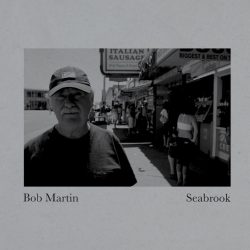“He could have been bigger than Dylan”.
 Among the 1970s singer/songwriters we have lost over the past year or so there is a name that passed with scarcely a mention outside his own circle of friends. Bob Martin. Who? Anyone with an ear for a story, a heart for its characters and empathy for a voice laden with emotion will love this collection of songs released after he died last September. Martin writes about ordinary lives lived, observations of people and places that can be amusing, serious, satirical, contemplative and sincere. To a simple melody Martin can boil down life’s complexities to what’s important and what is not. If you like Dylan, Prine, Taylor then Bob Martin could be for you.
Among the 1970s singer/songwriters we have lost over the past year or so there is a name that passed with scarcely a mention outside his own circle of friends. Bob Martin. Who? Anyone with an ear for a story, a heart for its characters and empathy for a voice laden with emotion will love this collection of songs released after he died last September. Martin writes about ordinary lives lived, observations of people and places that can be amusing, serious, satirical, contemplative and sincere. To a simple melody Martin can boil down life’s complexities to what’s important and what is not. If you like Dylan, Prine, Taylor then Bob Martin could be for you.
Who is Bob Martin? In the early 1970s record companies were on the hunt for the next James Taylor. A singer/songwriter from Lowell, Massachusetts called Bob Martin got an introduction to RCA who offered him a two record contract. His first album, ’Midwest Farm Disaster’, came out in 1972 to critical acclaim. Of particular note was the range of characters that populated Martin’s songs. However, Martin’s champion at RCA left not long after release so despite months spent touring the album in the US and Europe the record company lost interest in the follow up. That feeling was mutual, Martin quit the music business and with the proceeds from his debut bought a farm in Virginia. Later he moved back to Lowell where his jobs included teaching, carpentry, house painting, and taxi driving. But he never gave up writing. He self-released three further albums but none came near his debut in terms of praise.
A tenuous idea by Jerry David DeCicca of 1965 Records to reissue ‘Midwest Farming Disaster’ was replaced by Martin’s daughter Tami suggesting he record some of those songs her dad had written since. With engineer Jake Housh they got down to work. That was in 2008 but again a good idea got tangled up in all sorts of hassles. Martin lost interest and the plan was shelved. In 2021 with Martin’s health deteriorating Tami called DeCicca and Housh giving them the go-ahead to complete the album. DeCicca brought in his band The Black Swans to help and the result is ‘Seabrook’. Named after the town in New Hampshire where he spent his summer holidays, tragically Martin never heard the record.
But what a legacy. The album opens with ‘Three Miles Beneath This Mountain’, a bluesy, gentle strum leads into Martin’s rasping, “They rang the bell at number five/ We heard the whistle blow/ It was choked with dead black smoke/ Only two were left alive”. It takes Martin a little over three minutes to encapsulate the precarious existence of a West Virginian coalminer. This is a relatively new song as is ‘Midway Motel’, a piece of introspection about an extended motel stay. In a whisper, a background organ plays as if to a psalm of bereavement, “If I don’t get to heaven I’ve found a bed at last/ Right here at the Midway Motel”. There is no self pity, regret maybe and certainly acceptance.
Martin and his collaborators give full range to his writing career. Going way back, and to family, a subject that Martin returns to frequently, ‘My Father Painted Houses’ needs no further elucidation. DeCicca’s production and band lay down a haunting backdrop of acoustic and electric guitars that magnify Martin’s reminiscences, in particular the heartbreak of his departure for a life of music on the road as, “the old man was getting tired in the years before I left”.
Starting young, even writing in his father’s truck outside the bar where dad and his mate knocked back a couple of after work beers, Martin wrote hundreds of songs. Some he had been performing did not make it on to ‘Midwest Farm Disaster’, but two of these appear on ‘Seabrook’.One is ‘Give Me Light’ where every blast of harmonica and its brisk pace evoke the sense of freedom driven by the “wheels that sing a song to me”. The other debut reject ‘Stay Awhile Sunshine’ returns to the muse where surroundings illustrate feelings. Further confirmation of Martin’s love of the road comes with ‘Kerouac’, a blazing collage of characters like “Streetlight French” who are to be found around town at night.
After listening to this outstanding album you still wonder why wasn’t Bob Martin better known, Lowell historian Richard Howe offers this insight. Apparently next up after Martin’s RCA audition was an Englishman called David Bowie. In the early 1970s the label put its money on glam rock and Martin knew he couldn’t compete. In contrast, WBCN Boston disc jockey Charles Laquidar claimed, “If he had been given the right opportunities, and received the right breaks, he could have been bigger than Dylan,” Because, as Bob Martin said, “The most important thing in my music are the words”.



Seabrook is in New Hampshire, not Maine. Thanks for writing about Bob Martin. Captain Jesus thanks you too.
It is. That’s a shabby error, apologies and corrected. I hope you consider my understanding of ‘Seabrook’ the album superior to that of Seabrook the place. Warm wishes (and to The Captain).